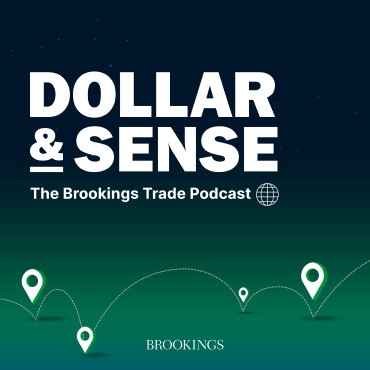From technology competition to the global rise of illiberalism, the United States will face numerous foreign policy challenges in the year ahead. John R. Allen, a retired U.S. Marine Corps four-star general and president of the Brookings Institution, joins David Dollar to discuss those challenges and how the new administration can work with America’s allies to meet them.
Related content:
How can Biden fulfill his ‘Build Back Better’ agenda?
A list of specific, actionable foreign policy ideas for the next president
Together, The U.S. And China Can Reduce The Risks From AI
Transcript
DAVID DOLLAR: Hi, I’m David Dollar, host of the Brookings trade podcast, “Dollars & Sense.” Today, we have a real treat. Brookings President John Allen is joining me for what I think of as a big picture discussion of U.S. international relations on the cusp of a new administration. During his long military career, ending as a four-star Marine Corps general, John Allen commanded NATO and U.S. troops in Afghanistan. He has a lot of experience to take up these issues of international relations, so thank you very much for joining our year-end and look-ahead broadcast, John.
JOHN R. ALLEN: Great to be with you, David. Thank you very much. It’s an honor to be with you.
DOLLAR: So, President-elect Biden has emphasized restoring relations with allies. Obviously, the big news as we enter 2021 is that we have a new administration coming in. You have had a lot of experience working with different allies. What do you see as the priorities here? And it’s easy to talk about working with allies, but what concretely does the United States need to do?
ALLEN: Well, first, David, it’s really good to be on this podcast, which is receiving such tremendous reviews. So, thanks for what you are doing overall on this podcast and getting out some very important messages. And you are right, this is a critical moment because we are facing a year of real potential change after a year that we all hope would be in our rearview mirror pretty quickly.
Let me open your question with a couple of broad comments. First, I don’t want to spend this podcast bashing the Trump administration. I don’t intend to do that at all. I will have to make some comparisons to create distinctions and differences, but it is not my intention to do that. Second, I would suggest that your listeners should listen very closely to Biden’s inaugural address. Every word in that address will have been chosen and the sentences will have been formulated to create a very important message. It is the first message of this administration, and it will not just be listened to by the American people. It will be, to your question, listened to by our allies and our opponents and our enemies overseas.
So, let me just hit several of what I think will be key messages in that inaugural address. First, it will be national unity and reconciliation, very importantly. Second, he’s going to deal with COVID. That’s going to be job one for him right now—to get that under control. The other side of that same coin is going to be dealing with the economic effects of COVID—getting Americans back to work with emphasis on the segments of the population that have been hit the hardest and the sectors of the economy that have been hit the hardest. He is going to spend a lot of time in that inaugural address talking about race, justice, and equity. He’s going to talk about climate change and climate justice. He’s going to talk about renewed and reinvigorated commitment as the United States of America to traditional American values and principles and will commit himself to an ethically-based administration and revitalizing American domestic policy based on that. Then, finally, to your point specifically, he is going to talk about foreign policy and how he hopes that foreign policy can once again be a platform for the demonstration of American values and American leadership.
So, to your question specifically, I know all of our opponents and all of our friends and all of our potential enemies overseas are listening very closely to what is going on in the United States right now. And I think that the Biden administration is going to enunciate a foreign policy that envisages very clearly a values-based intent to have a close partnership with our allies, with our partners, and with our friends. It’s going to be based on a common commitment to shared values that we inherently associate with democracies: human rights, the rights of women and minorities, the commitment to the rule of law, and very importantly the commitment to climate matters. It will emphasize American multilateralism, which will, I think, be music to the ears of our friends. And in that capacity, I think you are going to hear President Biden, Joe Biden, talk about the reestablishment—but in the context of partnership as opposed to hegemony—the reestablishment of American leadership on the world stage.
I think he will make the point that we are standing—our foreign policy will stand with our fellow democracies, but we’ll put on notice those democracies that have drifted into illiberal trends and we’ll put on notice those that are authoritarian states and certainly the totalitarian states.
You will hear him, I believe, in his foreign policy enunciations—and, of course, presumably Secretary of State Tony Blinken—talk about vocal support for multilateral organizations. So, you will hear, probably pretty early along, American commitment to the United Nations, stopping the American withdrawal from the World Health Organization. You will see an unambiguous American commitment to the North Atlantic Treaty Organization. And the earliest days of this current administration, four years ago, really spooked the alliance when there seemed to be ambiguity about American commitment to Article Five of the NATO charter.
You will see American commitment to and probably reentering UNRWA, which as you know well is the UN organization that has, in many respects, taken care of the Palestinian people. We withdrew from that to pressure the Palestinians to deal with the Israelis. You will see support for the GCC in the Gulf—the Gulf Cooperation Council. You will see support for the ASEAN. You will see support for human rights organizations around the world. And then economic entities; the World Bank group will get, I think, unambiguous support from the administration, along with the IMF and revision of the World Trade Organization. Then you will see commitment to specifics with regard to the Paris Climate Accord. I suspect we will rejoin or seek to rejoin that accord the day of the inauguration. Then whatever may be a successor organization to the JCPOA—the Joint Comprehensive Plan of Action with respect to Iran’s nuclear program.
So much of this has been signaled, not just by an intent, but by who the president-elect will appoint. So, our friends will be watching to see who those appointments are. And if at this point they have not felt confidence that these are people that they know, people that they trust, people that stand for values and American principles, than they are not paying attention. And I think that there is both value in paying attention to who was appointed but also to the policies themselves.
The Brookings Institution is committed to quality, independence, and impact.
We are supported by a diverse array of funders. In line with our values and policies, each Brookings publication represents the sole views of its author(s).






Commentary
PodcastJohn R. Allen on restoring American leadership in 2021
January 4, 2021
Listen on
Dollar and Sense Podcast